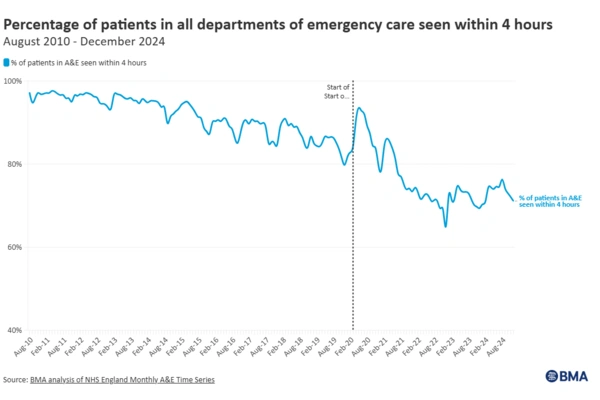Estimated reading time: 4 minutes
For many across the UK, lengthy NHS gynaecology waiting times have led to long-term pain and anxiety. But the good news is that getting treated sooner could be more affordable than you might think.
Whether you’re considering the NHS or exploring private healthcare options, understanding gynaecology waiting times and the factors that affect them can help you make an informed decision about your health.
This article looks at NHS and private gynae waiting times and explores how you could get treatment faster.

Private gynaecology treatment at a glance
- Waiting time: 4-6 weeks
- Cost: treatment dependent
- Ways to pay: self-pay, insured, payment plans
- Procedure time: treatment dependent
On this page:
The official NHS target for non-urgent gynaecology treatment is 18 weeks, but current UK waiting lists are lengthy – between 630,000 and 750,000 women on the waiting list. Conversely, private gynaecology surgery is much faster, often available between 4-6 weeks after initial consultation.
What is the average wait in the UK for gynaecology surgery?
The stated NHS aim is to treat patients within 18 weeks for non-urgent, consultant-led treatments.1 However, recent data shows that NHS gynaecology waiting lists have increased significantly, with many patients waiting months or even years for gynaecology surgical procedures.
According to a BBC report from November 2024, the NHS waiting list for gynaecological appointments has more than doubled since 2020. This has left around 630,000 people waiting for care.2
For urgent cases such as suspected cancer referrals, the NHS prioritises care to meet the two-week wait standard. This can mean that non-urgent gynaecological conditions like fibroids, endometriosis, or prolapse repair can remain on the waiting list for much longer.

Why is the gynaecology waiting list so long?
NHS England provides free, high-quality gynaecological care, but it’s important to remember demand often exceeds capacity. This has led to growing waiting lists for a number of different treatments, including gynaecology. Growing waiting lists in the UK are leaving many patients wondering how long they might have to wait for an appointment, diagnosis, or treatment.
Specifically, the following factors have contributed to long NHS waiting times:
- The NHS faces an ongoing shortage of gynaecologists, nurses and healthcare professionals
- The pandemic significantly disrupted elective surgeries, creating a backlog3
- Waiting times are often longer than other specialties due to the complexity of care needed
- Rising awareness of women’s health issues has led more people to seek the care and treatment they need4
How to check NHS gynaecology wait times near you
The My Planned Care service* is a good place to start. Select your local NHS hospital to access information about NHS gynaecology wait times near you. Compare hospitals and clinics in your area to see which have the shortest waits.
(*Practice Plus Group is not responsible for and does not control the content displayed on external websites.)
You can also contact your local NHS trust or hospital directly for the most accurate and current information.
Your GP will also be able to advise you about fast-track referral options for urgent conditions or help you explore alternative pathways to get care sooner.
The impact of longer waiting times on women’s health
Almost 90% of healthcare professionals think gynaecology waiting times are impacting patients’ quality of life, according to a recent survey by the Royal College of Obstetricians and Gynaecologists (RCOG). Longer waiting times lead to worsening symptoms for gynaecological conditions and an increase in the need for emergency care.5
When left untreated due to extended waits, certain conditions can develop. This can make them more challenging to manage and potentially require more invasive interventions further down the line. The stress and anxiety of living with these conditions can also affect mental wellbeing.
Gynaecology waiting list NHS vs private
Private healthcare offers a quicker route to gynaecological care. For many, the shorter surgery waiting times make private treatment an appealing option, particularly when facing long delays.
Private elective procedures at Practice Plus Group can be scheduled within 4-6 weeks, as opposed to several months with the NHS.
If you’re weighing up NHS and private care options, consider the following tips:
- Understand your needs – If your condition is urgent or affecting your quality of life, private care may be worth exploring to avoid long term pain or complications
- Talk to your GP – Your GP can refer you to an NHS gynaecologist and help you understand the expected waiting times. They can also provide advice on private care options if needed
- Research providers – If going private, compare costs, services, and reviews of local gynaecology clinics. Many private providers offer self-referral options, making it easy to book an appointment directly
- Assess costs – Private gynaecology surgery costs vary depending on the procedure and provider. You can choose to pay for yourself in one go, make smaller payments over time, or use health insurance if you have it.
The benefits of going private
- Shorter waiting times – Private surgery waiting times are typically much shorter than those on the NHS. This means faster diagnoses and treatments, reducing the risk of symptoms worsening over time. At Practice Plus Group, you can expect to get treatment within 4-6 weeks of your initial consultation
- More flexibility – You can schedule a private consultation and surgery at a time and place that suits you. This can make it easier to fit your healthcare needs around work or family commitments
- Continuity of care – At Practice Plus Group, you will see the same specialist consultant from start to finish. Thanks to this approach, you’ll benefit from stronger communication and a more personalised healthcare experience
- Choice of specialists – Choose your gynaecology consultant based on reputation, expertise, recommendations, or trust
- Faster results – With private healthcare, diagnostic tests such as ultrasounds, MRIs, or blood tests are usually conducted and analysed much faster than through the NHS. This can help to reduce the stress of waiting for results and allow treatment to begin sooner if needed
Bypass the NHS gynaecology waitlist
The decision between NHS and private gynaecological care often comes down to personal circumstances. While the NHS offers excellent care, current waiting lists mean delays are a reality for many. Wellsoon surgery from Practice Plus Group offers a faster, affordable alternative with different payment plans to suit your circumstances.
Don’t wait longer for your surgery! Take control of your gynaecological health and book a consultation to speak to a specialist.
Sources and references
1 https://www.england.nhs.uk/rtt/
2 https://www.bbc.co.uk/news/articles/clyvg2157mvo
3 https://www.bma.org.uk/advice-and-support/nhs-delivery-and-workforce/pressures/
6 My Planned Care: Royal Free London NHS Foundation Trust
7 https://www.myplannedcare.nhs.uk/find-my-hospital/postcode-search/

Acknowledgements
James Wood, Content Specialist
FAQs about gynaecology surgery waiting times
Not quite found the information you’re looking for? Our gynaecology surgery waiting times FAQs can help.
It varies, but for non-urgent cases, it can take several weeks to months depending on your location. Urgent referrals are usually faster.
Generally, you’ll need a referral letter from your GP or an e-referral through the NHS. At Practice Plus Group, you don’t need a referral if you’re a private patient. Simply fill in a booking form or get in touch to speak to our team and get the process started.
For non-urgent referrals, the wait can range from a few weeks to months. It depends on local demand and NHS capacity.
This is an urgent referral pathway for suspected cancer or other serious conditions. It ensures you’ll see a specialist within two weeks.
Conditions like severe pelvic pain, heavy or uncontrolled bleeding, ectopic pregnancy or ovarian torsion are considered emergencies. You should seek immediate medical attention if you have any concerns.
Urgent referrals are usually seen within 2 weeks to ensure quick diagnosis and treatment for potentially serious issues.






